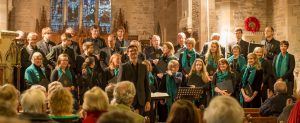
After the disappointment of having to cancel the 2020 Birthday Concert due to Covid, on Saturday 25 September it was a relief and a real pleasure to listen to what we missed last year. Not only did those in the audience have a real appetite for experiencing live music again, but this was also the first face-to-face concert for The Oriel Singers since the pandemic. It was refreshing to experience once again that essential interaction between performer and listener which no online alternative can possibly equal. The Oriel Singers, under their conductor Ben Sawyer, have built a reputation for the highest standards of choral singing, and have many accolades to their name, winning national competitions and taking part in radio broadcasts over the years. They are very much part of the Cheltenham music scene and (unlike many choirs) among their 26 members are an abundance of men!
The programme began with the magnificent flowing counterpoint of one of Bach’s six motets, in which the choir were joined by Warwick Cole at the organ. Three Renaissance pieces (motets by Palestrina and Guerrero and an anthem by Byrd) followed, each a fine example of its genre. William Byrd’s ‘Sing Joyfully’ was particularly exuberant as the Oriels projected its dance-like rhythms amid a complex polyphonic texture. Holst would certainly have approved of the inclusion of these early pieces, as this was exactly the type of programme he loved to present with the assortment of singers he assembled for Whitsuntide gatherings in London, Thaxted and Chichester.
After a rarely performed motet by Holst’s lifelong companion Vaughan Williams, the choir sang the much-loved three motets by his teacher Stanford, in which the unique character and craftmanship of these works shone through. In ‘Coelos ascendit hodie’ Stanford’s writing for double choir produced a vivid stereophonic effect from the choir.
It was good to include Imogen Holst’s Mass in A minor, not least because the HVH would not be here today had it not been for Imogen’s vision and generosity back in 1974. Having remained in obscurity for years, the work was recently recorded by the choir of Clare College, Cambridge and has now been published by Faber. I must admit that this music left me puzzled. Written in 1927 when Imogen was a student at the Royal College of Music, it is pleasant to listen to but the music bears an uncanny and very close resemblance to the much better-known Mass in G minor by Vaughan Williams (her teacher), written six years earlier. Could this be a case of ‘imitation is the sincerest form of flattery’? At least Imogen’s Mass is more accessible choirs as it is written in 4 parts, rather than for 8-part choir + solo quartet in Vaughan Williams’ example. A recent recording of her string chamber music has increased awareness of Imogen as a composer.
The concert finished amiably with Gustav Holst’s delightful Six Choral Folksongs, which range in mood from the beautifully lyrical ‘I love my love’ to the more energetic ‘Song of the Blacksmith’ and ‘Swansea Town’. Ben Sawyer introduced the songs and the Oriels performed them skilfully, engaging thoroughly with their varied moods, bringing to a close this highly enjoyable celebration of Holst’s birthday. The success of the event was largely due to the hard work and efficient organisation by a dedicated team of four, led by Catherine Martin. As we approach Holst’s anniversary year in 2024 let’s hope there can be an increasing awareness of his music through events like this.
John Wright



